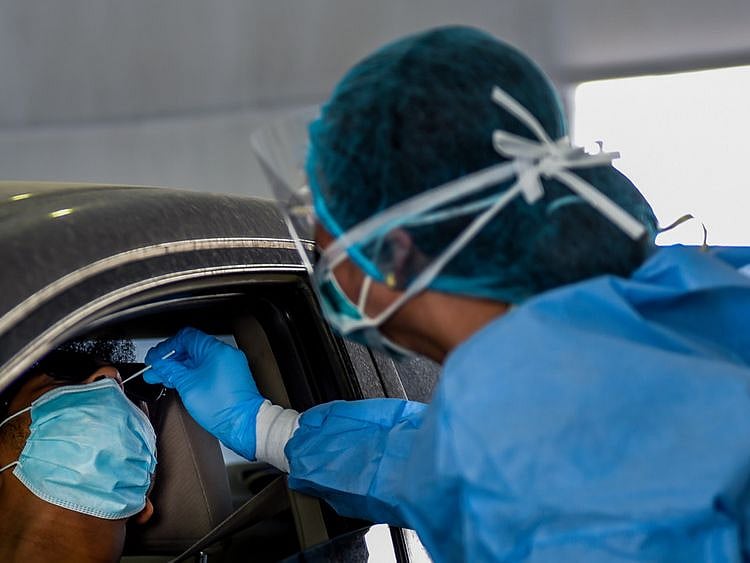COVID-19: UAE among the world’s first countries to test 50 per cent of its population
Increased recovery an important parameter in measuring success of containment measures

Also In This Package
Dubai: The UAE and Bahrain have become the world’s first countries with populations over one million to hit a 50 per cent testing rate for COVID-19. The UAE has achieved a coverage of 52.7 per cent and Bahrain 50.3 per cent of testing for their respective populations. Both UAE and Bahrain lead much of the world in testing for coronavirus and are currently ranked fifth and seventh, respectively, globally for tests per million population.
The milestone figures mean that scientists in the two Gulf Cooperation Council (GCC) nations can more accurately analyse the spread of the pandemic with access to a greater level of infection data per capita than anywhere else in the world.
Also Read
Visit these heritage homes of the UAE now converted to hotels and museumsCOVID -19: Dubai Summer Surprises gives families perfect reason to come together and enjoyIn pictures: Sheikh Mohammed launches Dubai Metro Route 2020COVID-19: See how Dubai airport handles international tourists and passengersCOVID-19: Tourists enjoy the sun and surf in DubaiA US firm is turning Arabian desert air into bottled waterPhotos: Dubai field hospital bids farewell to last coronavirus patientThis comes after research suggested that the COVID-19 recovery rate in GCC countries was significantly higher than the global average. An average of 75 per cent of patients have recovered in Bahrain, Kuwait, Saudi Arabia, the UAE and Oman — well above the global figure of 57 per cent.
In the UAE, police have deployed smart helmets capable of scanning temperatures of hundreds of people every minute.
With the global total of confirmed COVID-19 cases now standing at well over 18.7 million, and governments around the world bracing for a second wave of infections, the recovery rate has emerged as an important metric in measuring the effectiveness of responses to the pandemic by different countries.
Bigger countries with lower testing rates
Prior to this, only countries with smaller population sizes — under 33,000 — such as Monaco, Gibraltar and the Falkland Islands had succeeded in testing half of their residents and citizens.
Elsewhere, the United Kingdom, for instance, has achieved a testing rate of 24.9 per cent, while the United States stands at 18.6 per cent. After the UAE and Bahrain, Denmark (27.7 per cent) will be the next country to reach the benchmark figure, followed by Singapore (25.2 per cent).
Importance of testing
Testing has played a major part in the containment strategy for nations across the GCC, with all confirmed cases quarantined and treated in isolation.
In Bahrain, public buses have been converted into mobile testing units and citizens are summoned for tests at random. Early interventions included screenings at entry points and restrictions on travel from high-risk areas. Bahrain has also used multilingual robots in isolation wards to check body temperatures, administer medicines, serve meals and sterilise treatment rooms with beams of ultraviolet light.
Also Read
First off the mark: Two Keralite volunteers in UAE’s COVID-19 vaccine trial share experienceCOVID-19:Is it safe to take your kids to the salon?UAE reports 254 new COVID-19 cases, two deathsUAE launches new initiative with focus on reducing incidence of lung, ovarian and breast cancersWhat’s the percentage of COVID-19 cases in Abu Dhabi emirate?UAE Health Ministry begins Phase III clinical trials for COVID 19 vaccine in SharjahGulf News to host webinar on infertility and high-risk pregnanciesAll confirmed cases are quarantined and treated, with those unable to ensure home quarantine accommodated in institutional quarantine centres. As an additional precaution, those entering Bahrain are required to self-isolate for ten days upon arrival.
The figures from CoronaTracker.com represent the percentage of a country’s citizens that is confirmed to have been infected by the virus and who have made a full recovery.
In terms of recoveries too, GCC member-states have scored well above the global average, individually. Bahrain led the group with an 84 per cent recovery rate, followed by Kuwait (81 per cent), UAE (78 per cent), Saudi Arabia (70 per cent) and Oman (61 per cent).
Sign up for the Daily Briefing
Get the latest news and updates straight to your inbox
Network Links
GN StoreDownload our app
© Al Nisr Publishing LLC 2025. All rights reserved.